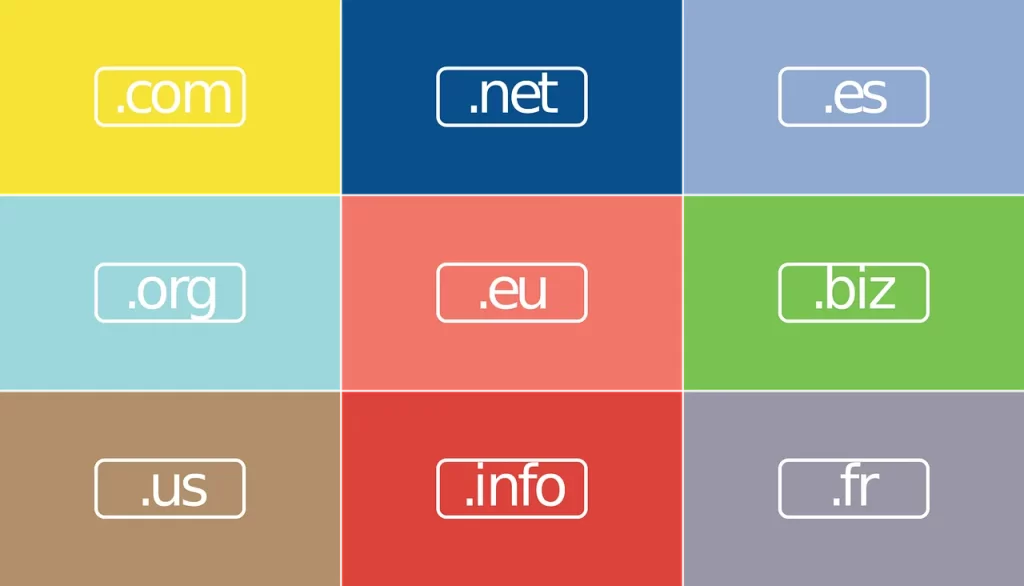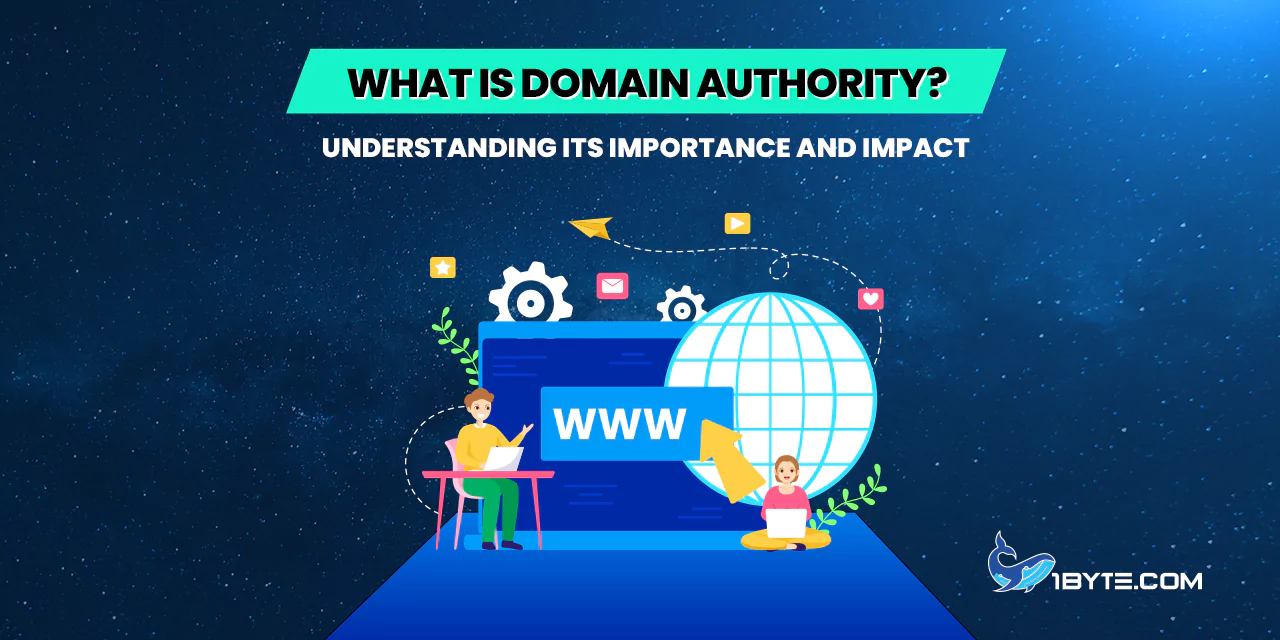- Understanding Domain Authority
-
10 Proven Strategies for How to Increase Domain Authority
- Strategy 1: Quality Content
- Strategy 2: On-Page SEO
- Strategy 3: Link Building
- Strategy 4: Internal Linking
- Strategy 5: Social Media Engagement
- Strategy 6: Mobile-Friendliness
- Strategy 7: Website Loading Speed
- Strategy 8: Regular Updates
- Strategy 9: User-Friendly Website Architecture
- Strategy 10: Register Domain for a Longer Period
- How to Improve Domain Authority
- Conclusion
In the constantly changing world of internet marketing, there is one term that has emerged as a major trend-setter and that is ‘Domain Authority’. But what is domain authority in the first place and why is it such a big deal? This article from 1Byte is intended to explain what this concept is, supported by the recent data and facts, and show how it works with examples.
Domain Authority or DA is a search engine ranking score that was created by Moz. It estimates the probability that a website will appear on the SERPs. The score varies between one and 100, and the higher the score the higher the probability of ranking. For example, a website such as Wikipedia, which is highly probable to appear in the first search results, has a DA of 77.
DA is based on Moz’s top web index and includes dozens of factors in its computation. Other SEO leaders have also created their own DA scores such as Semrush.
The domain authority scores are usually associated with higher search engine ranking. For instance, when a website has a DA score of 92, then the website pages will rank higher than a website with a DA of 65. Hence, an increase in the number of high-quality backlinks from various referring domains is associated with an increase in Domain Authority ratings.
Stay tuned for a deeper look at domain authority, how it is determined, and how you can enhance it in order to rank higher than your competitors and be more visible to potential customers.
Understanding Domain Authority
When it comes to SEO, there is one term that is quite significant and this is the term “Domain Authority”. But what is this Domain Authority? It is a score created by Moz that estimates the chances of a site’s ranking on the SERPs. This score is from one to 100 and the higher the score the higher the likelihood of ranking.
In 2019, the Domain Authority score of a domain is derived from the machine learning algorithm that predicts the frequency of Google’s use of the domain in the search results. This metric is requested over 1,000,000,000 times per year and is mentioned millions of times on the web. It has made its way to being a household name for any SEO specialist for almost any purpose, including evaluating the effectiveness of link building to qualifying domains for purchase.
Tune in as we explore more on what is domain authority, how it is determined, and how you can enhance your domain authority to rank higher than your competitors so that you can be visible to the potential customers.
What is Domain Authority?
Domain Authority or DA is a ranking metric invented by Moz that estimates the probability of a given site to rank in the SERP. It is a metric that provides you with the background information of the strength, usefulness, and pertinence of the website.
You can check your domain authority using Moz’s free domain authority checker. It provides a snapshot of the actionable data that powers Moz’s products. For a more in-depth domain analysis, you can try Moz Pro. It allows you to track thousands of websites and pages.
DA scores vary from one to 100 and the higher the score, the higher the chances of ranking. For example, a site with a high possibility of ranking on the first page of search engines like Wikipedia has a domain authority of 77.
How it is calculated
The DA score is obtained by assessing several parameters such as linking root domains and the total linking. It employs a machine learning model to prescriptively identify an algorithm that best matches link data to ranking on thousands of real search results.

Domain Authority is not a direct metric of the ranking, and it has no relation to the SERPs, especially Google SERPs. Nevertheless, the strategies applied to increase domain authority can help in SEO.
As of the Domain Authority 2.0 update in early 2019, the calculation of a domain’s DA score is based on a machine learning algorithm’s prediction of how frequently Google is using the domain in search results.
For instance, if domain A has a higher tendency of ranking in Google SERP as compared to domain B, then the DA of domain A should be higher than that of domain B. This makes DA a relative measure rather than an absolute measure.
It is possible to check the DA of your site using Moz’s Link Explorer, MozBar, which is Moz’s free SEO Chrome extension, or in Keyword Explorer, in the SERP Analysis tab.
As for what can be considered as good or average Domain Authority, the sites with millions of high-quality external links such as wikipedia.com or google.com are at the top of DA range, while small businesses or local websites with little to no inbound links will have much lower DA.
Importance of Domain Authority in SEO
According to the latest figures, 42.6% of link builders use metrics such as DA to determine the efficiency of link building. This goes to show how important DA is in SEO techniques that are implemented in websites. However, DA is not a ranking signal for Google or any other search engine and has no impact on SERP positions. It is used more in relative terms than in absolute terms since it is a ratio of two values.
There are several papers that can shed light on the functioning of DA. For instance, Moz’s web index that is considered to be the best in the industry is used by SEO professionals across the globe. It provides a glimpse of the data that drives Moz’s products, which is useful information that can be acted upon. Also, the DA score is computed by a machine learning algorithm that estimates the frequency of Google’s use of the domain in its search results. According to Moz, 21% of Google’s ranking algorithm depends on “link authority characteristics”. This is the number of links to a domain and the quality of those links. Additionally, 19% depends on page-level link characteristics. That is, the number of links to a particular page.
For instance, if the highly authoritative domain such as Facebook has a billion new links, all other sites’ DA would reduce compared to the new score of Facebook. This is because domains with more links and thus greater DA scores occupy more of the high DA positions and thus there is less space at the top for domains with fewer links. Hence, it is much easier to increase the score from 20 to 30 than from 70 to 80.
10 Proven Strategies for How to Increase Domain Authority
Welcome to the heart of our guide: 10 Proven Strategies to Increase Domain Authority. This section is dedicated to helping you understand how to increase domain authority. We’ll explore strategies that are backed by data and proven to be effective.
Strategy 1: Quality Content
Let’s start with Strategy 1: Quality Content. Quality content is the backbone of SEO. It’s a key factor in how to increase domain authority.
Quality content is accurate, comprehensive, original, and professionally presented. It matches your audience’s search intent. This means it answers the questions your audience is asking.
Quality content has a significant impact on SEO. Companies that publish blogs get 55% more traffic. They have 434% more pages indexed by search engines. These blog-publishing websites also had 97% more backlinks than non-blog sites.
Quality content attracts backlinks. Backlinks are links from other websites to your site. They influence how search engines perceive your website’s authority and relevance. Quality content can enhance your online reputation and attract more organic traffic.
Strategy 2: On-Page SEO
Let’s move on to Strategy 2: On-Page SEO. On-page SEO is a critical factor in how to increase domain authority. It involves optimizing individual web pages. This ensures that they rank higher and earn more relevant traffic in search engines.

On-page SEO includes both the content and HTML source code of a page. It differs from off-page SEO, which refers to links and other external signals. On-page SEO looks at what your site is about. Off-page SEO looks at how authoritative and popular your site is.
According to a report by Backlinko, Google uses over 200 factors in their algorithm for ranking websites. On-page SEO factors like high-quality content, page experience, and links ranked as the top 3 ranking factors of Google’s search results.
Here are some key on-page SEO practices:
- Keyword Optimization: This involves using relevant keywords in your content.
- Meta Tags: These are snippets of text that describe a page’s content.
- Schema Mark-up: This is a semantic vocabulary added to a website to help search engines understand the content.
- Internal Linking: This involves linking to other pages on your website.
- Images: Optimizing images can help improve your site’s SEO.
- Page Speed: A faster page load time can boost your site’s SEO.
- Featured Snippets: These are selected search results featured on top of Google’s organic results.
Remember, on-page SEO is a crucial part of how to increase domain authority. So, keep these points in mind as you work on improving your website’s SEO.
Strategy 3: Link Building
Let’s explore Strategy 3: Link Building. Link building is a key factor in how to increase domain authority. It involves acquiring hyperlinks from other websites to your own.
Link building is crucial for SEO. According to 13% of search experts from enterprise companies, it’s the most important SEO tactic. 52% of digital marketers noticed the direct impact of link building on organic search rankings. About 58% of businesses believe link building affects their ranking in the SERPs.
Here are some key link building statistics:
- 93.8% of link builders say link quality is more important than link quantity.
- 79.7% of SEOs consider link building an important part of their SEO strategy.
- 52.3% of digital marketers say link building is the hardest part of SEO.
- Only 2.2% of content gets links from more than one site.
- Google’s page ranking algorithm regards links as one of the top two criteria considered.
- According to SEO experts, backlinks are the third most important factor for ranking a site.
- The vast majority of online content, around 94%, does not receive any external links.
- The number of backlinks a web page has is directly correlated with the amount of organic traffic it receives.
Link building can be done in various ways. These include guest posting, broken link building, and using social media. Each method has its own benefits and challenges.
Remember, link building is a proven strategy for how to increase domain authority. So, keep these points in mind as you work on improving your website’s SEO.
Strategy 4: Internal Linking
Let’s delve into Strategy 4: Internal Linking. Internal linking is a key factor in how to increase domain authority. It involves creating hyperlinks that point to other pages on your website.
Internal linking is crucial for SEO. In fact, 51% of SEOs suggest including two to three internal links in articles. Meanwhile, 36% recommend adding three to five. These links guide readers to find content on your website. They also help search engines navigate through your site.
Here are some key internal linking practices:
- Link Important Pages From the Homepage: This helps distribute link authority to important pages.
- Add Internal Links In the Body of a Page: This provides a clear path for readers to find the information they need.
- Link New Pages To Old Pages And Vice Versa: This helps Google find, index, and understand all of the pages on your site.
- Use Keyword-Rich Anchor Text: This helps users and Google understand what the page you’re linking to is about.
- Add Links To Important Pages: This sends link authority to important pages, which can help them rank better in Google.
- Make Internal Links DoFollow: This allows search engines to follow the link and pass on link juice.
Remember, internal linking is a proven strategy to increase domain authority. So, keep these points in mind as you work on improving your website’s SEO.
Strategy 5: Social Media Engagement
Let’s delve into Strategy 5: Social Media Engagement. Social media engagement is a key factor in how to increase domain authority. It involves interacting with your audience on social media platforms.
Social media engagement is crucial for SEO. In fact, brands that have an active social media presence see a 23% revenue increase. Globally, over 3.6 billion people are active on social media. This presents a huge opportunity for marketers and advertisers.
Here are some key social media engagement practices:
- Post Regularly: This keeps your audience engaged and increases your visibility.
- Respond to Comments: This shows your audience that you value their input.
- Use Hashtags: This can help increase your reach.
- Share User-Generated Content: This can help build trust with your audience.
- Host Contests and Giveaways: This can increase engagement and attract new followers.
Remember, social media engagement is a proven strategy to increase domain authority. So, keep these points in mind as you work on improving your website’s SEO.
Strategy 6: Mobile-Friendliness
Let’s explore Strategy 6: Mobile-Friendliness. Mobile-friendliness is a key factor in how to increase domain authority. It involves optimizing your website for mobile devices.

Mobile-friendliness is crucial for SEO. In fact, mobile devices generated 59% of worldwide mobile traffic in the final quarter of 2022. It’s not just users that predominantly view your site from a mobile device, but Googlebot too. In 2016, Google announced mobile-first indexing. As a result, Google predominantly crawls the web via the Googlebot smartphone user agent. This means that Google will primarily use the mobile version of content for indexing and ranking.
Here are some key mobile-friendliness practices:
- Responsive Design: This involves designing your website so it looks and works well on any device.
- Fast Loading Times: Mobile users expect websites to load quickly.
- Easy Navigation: Mobile users should be able to easily navigate your website.
- Readable Text: The text on your website should be easy to read on a small screen.
- Clickable Links: Links and buttons should be large enough to be easily clicked on a small screen.
Remember, mobile-friendliness is a proven strategy for how to increase domain authority. So, keep these points in mind as you work on improving your website’s SEO.
Strategy 7: Website Loading Speed
Let’s delve into Strategy 7: Website Loading Speed. Website loading speed is a key factor in how to increase domain authority. It refers to how quickly a website becomes fully accessible to a user after they request it.
Website loading speed is crucial for SEO. In fact, the average web page load time is 2.5 seconds on desktop and 8.6 seconds on mobile. The average desktop First Input Delay (FID) speed is 12.73 milliseconds, and on mobile, it’s 59.73 milliseconds. Webpages on mobile take on average 70.9% longer to load than on desktop.
Here are some key website loading speed statistics:
- Only the top 20% of websites record a server response time below 312ms.
- Only 15% of websites have acceptable loading times.
- 46% of websites load in around 6-10 seconds.
- Large web pages take 381% more time to load than smaller web pages.
- The fastest load times worldwide are found in China, Japan, and Germany.
- The slowest loading times for web pages were recorded in Australia, India, and Brazil.
- 50.6% of customers often blame poor internet connection for loading delays before blaming the websites.
You can evaluate your page speed with Google’s PageSpeed Insights. It incorporates data from CrUX (Chrome User Experience Report) and reports on two important speed metrics: First Contentful Paint (FCP) and DOMContentLoaded (DCL).
Strategy 8: Regular Updates
Let’s explore Strategy 8: Regular Updates. Regular updates are a key factor in how to increase domain authority. It involves keeping your website content fresh and up-to-date.
Regular updates are crucial for SEO. In fact, bloggers who update old content are “twice as likely to report success”. Google has reduced the number of irrelevant results appearing on search results pages by over 40% in the past five years due to frequent updates.
Here are some key regular update practices:
- Update Old Content: This involves revising and improving existing content.
- Add New Content: This involves creating new content on a regular basis.
- Remove Outdated Content: This involves deleting content that is no longer relevant.
- Check for Broken Links: This involves fixing or removing any broken links.
- Update Metadata: This involves updating the meta tags and descriptions.
Remember, regular updates are a proven strategy for how to increase domain authority. So, keep these points in mind as you work on improving your website’s SEO.
Strategy 9: User-Friendly Website Architecture
Let’s delve into Strategy 9: User-Friendly Website Architecture. User-friendly website architecture is a key factor in how to increase domain authority. It involves organizing your website’s pages in a way that is easy for users and search engine crawlers to navigate.
User-friendly website architecture is crucial for SEO. In fact, Google’s algorithms prioritize websites that offer a superior user experience. These algorithms assess various UX factors such as mobile responsiveness, page load speed, and ease of navigation.
Here are some key user-friendly website architecture practices:
- Keep a Simple Hierarchy: A simple hierarchy keeps information organized and easy to find.
- Organize Subpages in Proper Categories: Proper categorizing of subpages is essential for user experience and SEO.
- Implement Logical Internal Linking: This involves creating hyperlinks that point to other pages on your website.
- Optimize URL Structure: This involves creating URLs that are easy to read and understand.
- Keep Sitemaps Updated: This involves regularly updating your sitemap to reflect any changes to your website.
Remember, user-friendly website architecture is a proven strategy for how to increase domain authority. So, keep these points in mind as you work on improving your website’s SEO.
Strategy 10: Register Domain for a Longer Period
Let’s explore Strategy 10: Register Domain for a Longer Period. Registering your domain for a longer period is a key factor in how to increase domain authority. It involves securing your domain name for an extended period.
Registering your domain for a longer period is crucial for SEO. In fact, there were 249.9 million registered domains in 2022, representing a year-over-year decline of 4%. Most of the decline is due to the decrease in registrations of coronavirus-related domains. The .fr domain was one of the most successful domain extensions in 2022, reaching the 4 million registration mark.
Here are some key practices for registering your domain for a longer period:
- Secure Your Domain: This involves registering your domain for a longer period to prevent it from being taken by someone else.
- Build Trust with Search Engines: Search engines may view domains registered for a longer period as more trustworthy.
- Avoid Expiration: This involves ensuring that your domain does not expire, which could lead to a loss of traffic.
- Save Money: Registering your domain for a longer period can often be cheaper than renewing it every year.
Remember, registering your domain for a longer period is a proven strategy to increase domain authority. So, keep these points in mind as you work on improving your website’s SE
How to Improve Domain Authority
It is not a one-time process to enhance the domain authority, but a continuous process that requires the implementation of multiple strategies. It involves the process of acquiring quality backlinks, creating good content, and focusing on the technical factors of your website.
Tips and Strategies to Improve Domain Authority
Boosting your website’s DA is a long and intricate process, which should be based on proper knowledge of SEO trends. Here are some specific tips and strategies to enhance your DA:Here are some specific tips and strategies to enhance your DA:
Quality Content
The foundation of any website with high DA is quality, uniqueness, and relevance of the content. Ensure you post new content on your website that will be useful to your audience on a frequent basis. For instance, a blog post such as ‘The Impact of Domain Authority on SEO’ will be likely to attract both the first time and repeat visitors.
On-Page SEO
Make sure your content is SEO friendly by following proper heading structures, proper keyword placement, and meta description tags. For example, incorporating the focus keyword “what is domain authority” in the title, headings, and meta description can assist in ranking your page.
Link Building
Backlinks from authoritative sources are very useful in increasing your DA since it is a quality indicator. Contact leaders in the industry, contribute to other blogs, and use social networks to promote your content.
Internal Linking
Internal linking can also be used in your own pages so that search engines can easily understand the structure of your site and thus enhance the site crawlability and user experience. For instance, the blog post ‘Understanding Page Authority’ can be linked to another blog post ‘What is Domain Authority’ to help the users navigate more of your content.
Mobile-Friendly Website
It is important to have a mobile version of the website since most of the users are browsing the websites using their mobile devices. Make sure you use the responsive design so that your website is equally good to look at and to navigate on any device.
Website Loading Speed

A site that loads quickly is more enjoyable to the users and is preferred by search engines. One of the ways of determining the speed of your site is by using tools such as Google’s PageSpeed Insights that will inform you of the current status and recommend what can be done to improve on the situation.
Social Signals
Although DA is not directly influenced by social signals such as likes, shares, and comments, they can affect your DA. Share your content on social media platforms in order to enhance its reach.
Bear in mind that the process of increasing your Domain Authority is gradual. It is not about a few days or weeks of work but about the constant and rigorous work and the quality of every aspect of your website. Just keep on practicing, keep on learning and you will notice that your DA score is improving over time.
Importance of quality content, strong internal linking, and a clean backlink profile
When discussing “what is domain authority”,, it is necessary to consider quality content, internal linking, and backlink profile. These three elements are the basic ones that can help you increase your domain authority and rank higher in search results.
Quality Content
Content is the king in any SEO strategy and this is why quality content should be produced. It tells search engines such as Google that your website is worthy to be recommended. Moreover, 68% of web users’ interactions start with a search engine, while SEO generates 1000%+ more traffic than organic social media. Hence, the generation of high quality optimized content increases the likelihood of the website appearing on the first page of Google.
Quality content is used to communicate, teach, entertain, or persuade an audience with a certain purpose. It can be in the form of web page, video, social media update, blog post, white paper, infographic, image, and email.
For example, if you are an art supplies company that sells paint brushes and acrylic paint, your content can be relevant to the search query “best painting supplies.” By providing good quality, relevant content, you increase your likelihood of getting on the first page of Google.
Strong Internal Linking
Internal links are the links that are placed within your site that direct the visitors to other pages within the same site. They assist the visitors to find their way around your site and can also assist in the improvement of SEO. Internal links are “super critical” for SEO, as stated by John Mueller, Senior Search Analyst at Google.

Internal links achieve this through the redirection of the PageRank throughout your site. The number of internal links pointing to a page determines the page’s PageRank. However, it is not the number of links but the quality of the link that is very important in the process.
For instance, if you have an online shop, then you may wish to direct your clients to your most popular or new products through a homepage link. It is useful for the visitor who wants to go directly to the products and buy them and also improves the usability by creating a good internal link structure.
Clean Backlink Profile
Effective backlinking not only helps in building the credibility of the website among the search engines but also helps in getting better visibility and ranking on the search engine result pages. Backlinks are links on other websites which direct the users to your website. They are like votes of credibility in the world of SEO from other sites.
For instance, if a website about British hedgehogs has a page about a hedgehog awareness drive and includes a link to a useful and pertinent resource that helps in recording hedgehog sightings, then the hedgehog map can be said to have obtained a backlink from the British hedgehog site.
The quality of the content, internal linking, and backlink profile are crucial when it comes to increasing the domain authority of a website. By targeting these areas, you will be able to improve your SEO efforts and thus improve your website’s ranking in the search engine results page.
Leverage 1Byte’s strong cloud computing expertise to boost your business in a big way
1Byte provides complete domain registration services that include dedicated support staff, educated customer care, reasonable costs, as well as a domain price search tool.
Elevate your online security with 1Byte's SSL Service. Unparalleled protection, seamless integration, and peace of mind for your digital journey.
No matter the cloud server package you pick, you can rely on 1Byte for dependability, privacy, security, and a stress-free experience that is essential for successful businesses.
Choosing us as your shared hosting provider allows you to get excellent value for your money while enjoying the same level of quality and functionality as more expensive options.
Through highly flexible programs, 1Byte's cutting-edge cloud hosting gives great solutions to small and medium-sized businesses faster, more securely, and at reduced costs.
Stay ahead of the competition with 1Byte's innovative WordPress hosting services. Our feature-rich plans and unmatched reliability ensure your website stands out and delivers an unforgettable user experience.
As an official AWS Partner, one of our primary responsibilities is to assist businesses in modernizing their operations and make the most of their journeys to the cloud with AWS.
Conclusion
It is essential to know what is domain authority for anyone that is involved in the SEO business. It is one of the important parameters that gives an idea about the likelihood of a site’s performance in the search engine results.
Current data indicate that websites with higher domain authority receive better ranking on the search engine result pages. This is supported by several articles and case studies which you can find more information on in the links scattered throughout this article.
Therefore, as you proceed with your SEO process, do not stop questioning what is domain authority and how to make it better. But do not forget the forest for the trees. SEO is a complex science, and everything should be done in moderation.
Remember, Rome was not built in a day, and neither is the authority over a domain. It requires patience, energy, and a good plan. However, with determination and the right strategies, one can increase the domain authority and in extension the search engine ranking. Happy optimizing!

